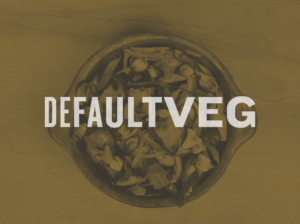
DefaultVeg is an international partnership between The UK Food Plan, CreatureKind and The Better Food Foundation. Each partner shares the goal of changing the way organisations think about and source their food. [4] Poore J, Nemecek T. Reducing food’s environmental impacts through producers and consumers. Science. 2018 Jun 1;360(6392):987-992. doi: 10.1126/science.aaq0216. Erratum in: Science. 2019 Feb 22;363(6429): PMID: 29853680.
From now on, the Uehiro Centre will provide plant-based food and drinks by default for all meetings and events that we host. Participants retain the choice to opt for meat and/or dairy options. (For more information about our strategy, click here.) Food is deeply embedded in cultural and social values, and we realise people do not always find it easy or desirable to entirely change their eating habits overnight. Changing defaults is a great way to shift purchasing power towards plant-based foods, while still preserving freedom of choice for every meal.
(Please, do get in touch with me at katrien.devolder@philosophy.ox.ac.uk if you have questions about how to embark on this project. It’s easier than you think!)
[3] See, for example, The EAT-Lancet Commission on Food, Planet, Health, available at: https://eatforum.org/eat-lancet-commission/; Springmann, M., Clark, M., Mason-D’Croz, D. et al. Options for keeping the food system within environmental limits. Nature 562, 519–525 (2018). https://doi.org/10.1038/s41586-018-0594-0 Our current food and farming system is seriously harmful for the environment, our health, and animals. Animal agriculture is one of the biggest contributors to global heating. It is the single biggest cause of deforestation globally (to make space for cattle, and cattle feed). It is also a major polluter (e.g., through producing manure, and by emitting 14.5% of global greenhouse gas, i.e., more than the emissions of all transportation combined). It is bad for animals; not only for the billions of animals that suffer in factory farms, but also for wild animals who lose their habitat because of the animal agricultural sector’s land use. Animal agriculture is also a major contributor to antimicrobial resistance, resulting in antibiotics no longer being effective in humans, and industrial farms are breeding grounds for pandemics. Consuming meat also has direct adverse health effects for humans. For example, the consumption of red and processed meat significantly increases the risk of developing cardiovascular disease, type 2 diabetes, obesity, and certain types of cancer.
Our food and farming system clearly is unsustainable. A major study led published by an Oxford scientist in 2019 concluded that the single biggest way to reduce our environmental impact on the planet is to avoid meat and dairy products.[4]
The Oxford Uehiro Centre for Practical Ethics has chosen to do its part in achieving that goal by signing up to the DefaultVeg initiative.
[2] National Food Strategy. Independent Review for the Government. Availabl at https://www.nationalfoodstrategy.org. By Katrien Devolder
“Britons have cut their meat consumption by 17% over the past decade but will need to double these efforts if they are to meet targets for healthy diets and sustainable food production set out in the national food strategy earlier this year”. So began an article in The Guardian last Friday.[1] The article was reporting the guidance of the National food strategy[2]—commissioned by the UK government, but developed by an independent team in 2021—which recommends that meat consumption is cut by 30% within a decade. Many scientific studies have concluded that we (i.e., richer countries) need to be even more ambitious than that, especially if we want to halt the climate crisis.[3]
[1]Geddes, Linda. ‘Britons cut meat-eating by 17%, but must double that to hit target’, The Guardian, 8 Oct 2021.
At the Uehiro Centre, we aim to do our part in changing our food system for the better. But of course, the more research centres, organisations, departments, colleges, companies etc. that adopt this approach, the greater the impact will be! So, why not consider going DefaultVeg with your organisation?
References:

